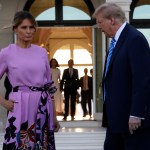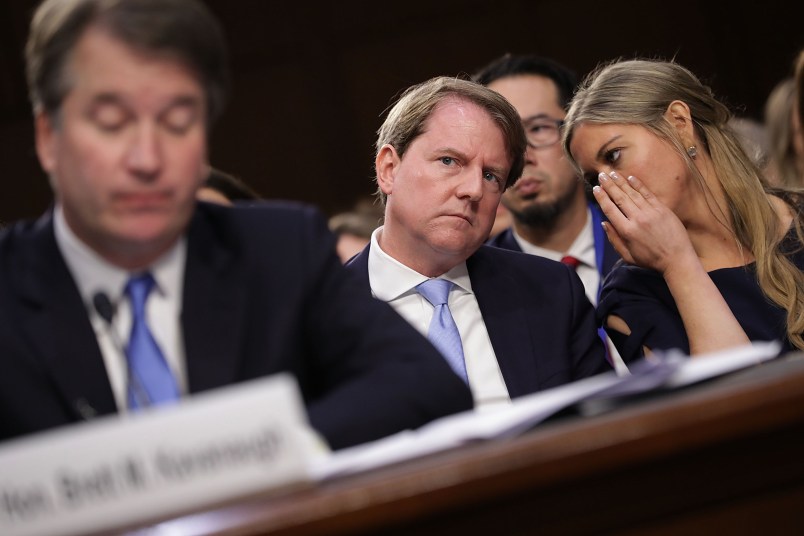Federal courts should not rule on separation-of-powers disputes between Congress and the White House, the Justice Department argued Friday.
The oral arguments came in D.C. federal appeals court as the House Judiciary Committee seeks to enforce a subpoena it issued in April for testimony from former White House counsel Don McGahn.
“We have two branches at loggerheads here, and the question is, is there no proper role for the court?” asked Judge Judith Rogers at one point.
Hashim Mooppan, arguing for the DOJ, contended that Congress needs to rely on “political remedies, political tools” to resolve the dispute, and repeatedly warned that were the court to decide on the merits of the case, “there would be case after case” like this.
“It won’t be good for the courts and it won’t be good for either of the political branches,” Mooppan said.
Trump made history this year by issuing an unprecedented order that the executive branch ignore subpoenas sent by Congress. His administration has fought a series of congressional subpoenas for his financial records in the court, but the McGahn case is a different animal: in this case, the House is asking a court to force McGahn to testify against an order from Trump directing him not to.
The McGahn suit raises a crucial question which goes to the heart of Trump’s efforts to prevent Congress — and various law enforcement bodies — from investigating him and his financial records. The lawsuit seeks testimony from McGahn relating to Trump’s earlier efforts to obstruct the Mueller investigation, leaving the judiciary to decide whether the legislative branch has the authority to hold the executive accountable in situations of gross misconduct.
Judge Thomas Griffith pointed out the starkly unprecedented nature of the Trump administration’s stonewalling of congressional oversight in a question for Moopan.
“Has there ever been an instance of such a broadscale defiance of congressional inquiries … in the history of the Republic?” Griffith asked, before inquiring whether a president had ever given an instruction “not to cooperate.”
“Not to my knowledge,” Mooppan replied.
Mooppan went on to argue that “the court should not be refereeing whether the President or Congress is acting inappropriately,” and contended that the court should rule against Congress by deciding that the House had no right to sue.
The panel of three judges also asked what effect the House’s approval of two articles of impeachment against President Trump would have on the case. Trump’s impeachment played a creeping role in the background as the two sides prepared for oral arguments. The Justice Department argued last month that impeaching the President meant that the case no longer needed to be fast-tracked, after the court asked for briefs “addressing the effect of the articles of impeachment on the issues in this case.”
The articles of impeachment for which President Trump is set to be tried only obliquely mentioned the findings of the Mueller investigation, noting that his actions during the Ukraine pressure campaign and impeachment inquiry were “consistent” with “previous efforts to undermine United States government investigations into foreign interference in United States elections.”
On Friday, House attorney Megan Barbero said that the second article of impeachment —- about obstruction of Congress — “refers to the President’s previous efforts to undermine governmental investigations into foreign interference in United States elections.”
She added that if McGahn’s testimony were to establish a “pattern,” that could bolster an argument for “whether the remedy of removal is an appropriate remedy.”
Barbero added, under questioning from Judge Griffith, that the House may yet approve an additional article of impeachment against Trump, depending on the results of McGahn’s testimony.
But the hearing also revealed that it remains unclear the extent to which McGahn, even if compelled to testify, would reveal what he knows about President Trump’s obstruction of the special counsel investigation.
Judge Karen Henderson asked Mooppan at one point whether McGahn would assert attorney-client or executive privilege if made to testify.
“If Mr. McGahn were to have to testify,” Mooppan said, “he would not just have attorney-client, but a host of executive-privilege-based objections,” the DOJ attorney replied.
Later on, Judge Griffith asked Barbero what the House would do if McGahn stonewalled questioning via executive privilege assertions.
“We expect that we would go back to the district court for a resolution of those questions,” she replied.
The House sued in August to enforce a subpoena it issued for McGahn’s testimony, calling the former White House counsel at the time its “most important witness” as part of an impeachment inquiry. President Trump had ordered McGahn to ignore the subpoena, issued by the House Judiciary Committee in April.
But within a month, the locus of scandal had shifted from the remnants of the Mueller investigation to the President’s effort to extort Ukraine into manufacturing useful political dirt, in part by withholding $391 million in military assistance.
Trump appealed after a D.C. federal district judge ruled in November that President Trump does not have the authority to block McGahn from obeying Congress’s demand for his testimony. In a symbolic move, the same judge refused to issue a stay of the subpoena pending appeal.











So Executive Power is unchecked and there is no remedy or Constitutional oversite by Congress?? I call BS!
Check.
Questions for the lawerly among us:
The GOP are bad faith actors, that’s all there is to it. They’ve taught their base to HATE democrats, and they will choose despotism over democracy in a heartbeat.
They need to be driven from this land in shame as the racists, toadies, and warmongers that they are.
Wait a minute… My understanding has always been that we have the three branches of government to counter balance and act as checks on each other. But now the DOJ is actually arguing that the courts have no authority in disputes between the Executive and Legislative branches ? That seems a unique interpretation of our system.